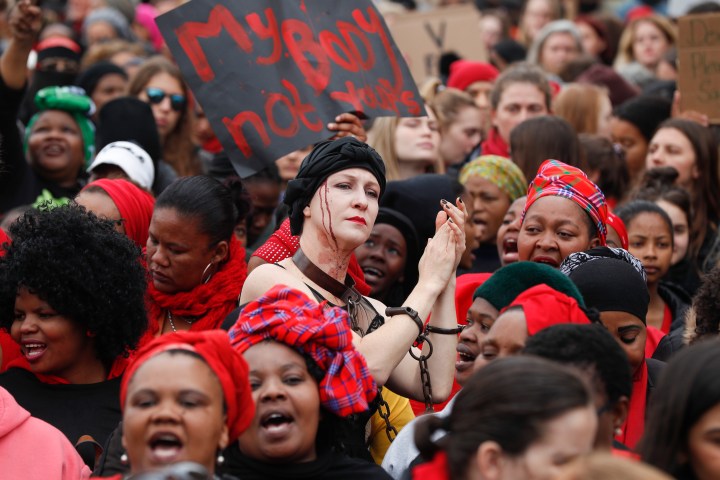ISS Today
A law isn’t enough to stop domestic violence

For South Africa’s Domestic Violence Act to work, all those responsible for its implementation must be accountable. By Penny Parenzee for ISS TODAY
First published by ISS Today
Twenty years after the Domestic Violence Act was passed, intimate partner violence remains a serious problem in South Africa. Victims of domestic violence, the police and shelters face numerous challenges in responding to the crisis.
The problem is aggravated by poor parliamentary oversight and difficulties in holding the police accountable for their shortcomings. It is clear that protecting victims and holding perpetrators to account takes more than just a good law.
The South African Police Service’s (SAPS) 2016/17 crime statistics showed that in that financial year, 53,263 women reported being assaulted and 2,930 women were murdered, many at the hands of their intimate partners. Ahead of government’s national summit on gender-based violence from 1-2 November, the time is right to assess what is working, what is not, and what needs to change.
South Africa’s Domestic Violence Act is considered among the most progressive worldwide. It was informed by expert input from government and civil society. It sets out in detail how police should respond when cases are reported and requires the SAPS to report annually to Parliament.
When the police respond to a call from a victim of domestic violence, there are certain things they must do. They need to explain to victims that they are there to help them, for example by finding a suitable shelter, and ensuring they receive medical treatment.
They must tell victims that they have a right to apply for a protection order, and explain how to do so. If instructed by the court, the police must serve notice on the abuser to appear in court and serve protection orders.
Police must arrest the abuser if the protection order is violated, and remove weapons that the abuser may have in their possession or at their home. If the complainant needs to collect personal items from his or her home, the police must accompany the complainant. The police must keep records documenting reports of domestic violence incidents.
The law also addresses the role of clerks of the court and magistrates, who are instrumental in ensuring that protection orders are issued and adhered to. Prosecutors are not explicitly mentioned in the Domestic Violence Act, but they have a role when a victim lays a criminal charge, or if an abuser breaches a protection order.
The act states that no prosecutor will refuse to institute a prosecution or withdraw a charge unless authorised in writing by a duly designated senior member of the National Prosecuting Authority. This means that all perpetrators of domestic violence should be held to account by the courts.
Since the act came into effect, much research has been done and a lot has been written about its implementation and oversight challenges. For example, police don’t always help victims find shelters or serve protection orders, and clerks of the court don’t always help victims complete forms to access a protection order. There are often personnel shortages at police stations and courts.
Research on the experiences of women and service providers has repeatedly identified systemic challenges. These include a lack of co-ordination across responsible departments; inadequate budget allocations for the full spectrum of services needed to address domestic violence; and most important, the absence of effective accountability mechanisms.
First responders, police detectives, the National Prosecuting Authority, parliamentary researchers and those providing psycho-social services to victims of domestic violence discussed these challenges at a dialogue hosted by the Hanns Seidel Foundation and the Institute for Security Studies last month.
They emphasised the unrelenting systemic failures that hinder access to justice, and undermine the long-term safety for victims of domestic violence, including children. One of the most pronounced of these systemic challenges is the failure of the act to require all stakeholders in response systems to account for their actions. Only police are expected to account to Parliament.
When the Independent Police Investigative Directorate and the Civilian Secretariat for Police replaced the Independent Complaints Directorate in 2012, an erosion of policing accountability for domestic violence occurred. The Independent Complaints Directorate was the civil oversight structure intended to deal with non-compliance on the part of the police.
Currently the Civilian Secretariat for Police lacks authority to investigate and has no power to enforce compliance of recommendations issued to the police. The police station audits that it conducts to determine compliance are done inconsistently, without standardised means of reporting.
Accountability needs to be strengthened with mechanisms in place that require all relevant stakeholders (not just the police) to report to Parliament on how they help ensure access to justice in domestic violence matters.
For example the Department of Social Development must demonstrate how the shortage of shelters is being addressed, and what is being done to ensure that women with older children can access shelter services. Relevant departments including National Treasury should account for the funds allocated to improve responses to domestic violence. Parliament should be more visible in upholding accountability.
More strategic thought needs to go into mechanisms of accountability. As parliamentary senior researcher Joy Watson says: “Consideration needs to be given to ways (to influence) planning and budgeting processes, advocate for ring-fenced budgeting for operational and infrastructure costs as well as push for better collaboration and co-ordination between state role players and NGOs.”
Talking about the same challenges year after year should be unpalatable. South Africa needs to do accountability differently, so that these failures that consistently define the response to domestic violence, can be overcome. DM
Penny Parenzee is an ISS Consultant
















 Become an Insider
Become an Insider